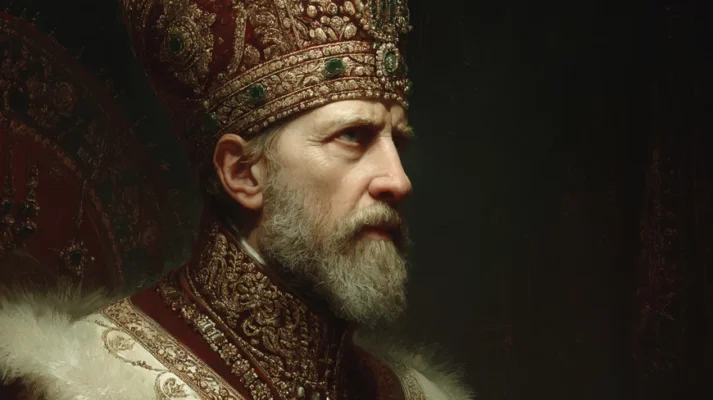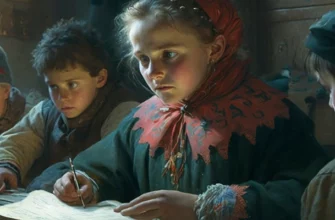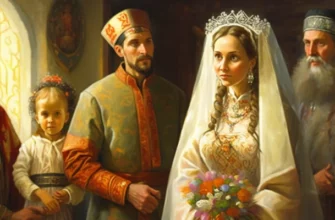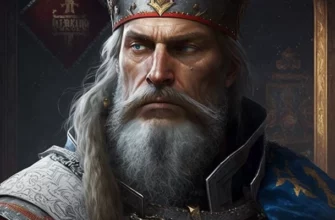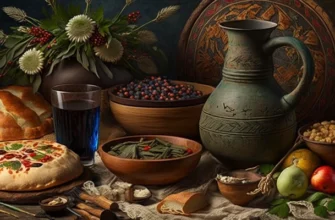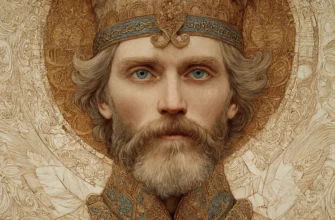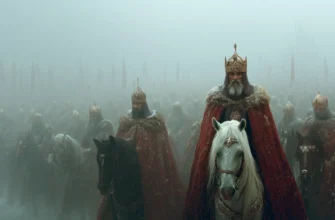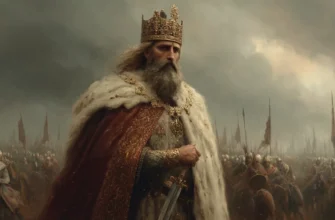Volodymyr Monomakh (1053-1125) was a prominent statesman, commander, and writer of the Kievan Rus period. He was the grandson of Yaroslav the Wise on his mother’s side and the son of Grand Duke Vsevolod Yaroslavich. The nickname “Monomakh” comes from the name of his maternal grandfather, the Byzantine Emperor Constantine IX Monomakh.
Volodymyr began his political activity early, actively fighting against the Polovtsians, participating in numerous campaigns. His authority among the princes was high, which allowed him to unite the Russian lands and try to stop internecine wars.
In 1113, after the death of Prince Sviatopolk, Kyivans invited Volodymyr to the throne, which testified to his popular support. His reign in Kyiv was peaceful and stable: he carried out a number of reforms, strengthened the centralized government, and promoted education and culture.
One of Volodymyr’s most famous works is “Teachings to Children,” a moral and ethical work in which the prince shares his own experience of governance, calls for justice, mercy, and love of knowledge.
Volodymyr Monomakh is remembered as a wise and prudent ruler who sought the unity and strength of Rus, becoming a symbol of national unity and state wisdom.ContentsBiography and originPolitical activityUnification of Russian landsForeign policyRelations with ByzantiumMilitary activity“Teachings of Vladimir Monomakh”Contribution to the development of the statePromotion of peace in RussiaDeath and legacyThe memory of the prince in history and cultureConclusionsTable of contents
Biography and origin
Volodymyr Monomakh was born in 1053 in the family of Grand Duke Vsevolod Yaroslavych of Kyiv and a Greek princess, the daughter of the Byzantine emperor Constantine IX Monomakh. It was from his maternal grandfather’s name that his nickname, Monomakh, came, emphasizing his connection to the Byzantine imperial family.
From childhood, Volodymyr received a good education, brought up in the spirit of Christian morality, Russian tradition, and Byzantine culture. He was prepared for government, so he became involved in political life early on.
At a young age, he was granted a fief in Pereyaslav, and later ruled Smolensk, Chernihiv, and other cities. His activity was already characterized by a desire for peace, justice, and protection of the people. Volodymyr had a large family: he was married twice and had many children who also became princes and influential figures.
Political activity
Volodymyr Monomakh’s political activity was aimed at strengthening the unity of Rus, fighting strife, and protecting the state from external threats. Already in his younger years, he actively participated in princely congresses, advocating peace between princes and joint action against enemies.
One of the key events was the conclusion of the Lyubech Congress of Princes in 1097, where Volodymyr initiated an agreement to end the strife and divide the lands “to each his own fiefdom.” This congress was an important step toward stabilizing the political situation.
In 1113, after the death of Prince Sviatopolk Izyaslavych, an uprising broke out in Kyiv. The people invited Volodymyr to the princely throne. When he became the prince of Kyiv, he began reforms: he updated the Statute of Volodymyr Monomakh, a set of laws that regulated social relations, limited usury, and protected the common people.
Volodymyr tried to centralize power, unite the Russian lands around Kyiv, and strengthen the authority of the princely government. His policy was flexible, balanced, and far-sighted, which allowed him to ensure a period of relative peace and stability in the state.
One of Volodymyr Monomakh’s most important missions was to fight feudal strife, which weakened Rus and caused the disintegration of the state’s unity. At a time when princes were constantly fighting for power and territory, Volodymyr consistently advocated harmony and joint action for the benefit of the people.
The culmination of his peacekeeping policy was the Lyubech Congress of Princes in 1097, initiated by Volodymyr himself. Under the slogan “so that everyone may own his homeland” an agreement was reached on the division of lands between the princes, which was supposed to reduce disputes and wars. Although the agreements were repeatedly violated over time, the congress was an important step toward establishing the principle of hereditary ownership.
In the following years, Monomakh continued to act as a conciliator: he repeatedly intervened in conflicts between princes, tried to prevent bloodshed, and called for unity. His personal authority and diplomatic skills allowed him to restrain the ambitions of individual rulers.
Thanks to Volodymyr’s decisive and wise actions, during his reign, Russia was able to temporarily overcome fragmentation and move to relative internal stability.
Unification of the Russian lands
Volodymyr Monomakh was one of the first Rus’ princes to consciously seek to unite the scattered lands of Kievan Rus’ around a central authority. The feuds between the princes, which had been going on for decades, weakened the state and made it vulnerable to external attacks, especially from the Polovtsians.
After becoming Kyiv’s prince in 1113 at the invitation of Kyivans, Volodymyr began to strengthen the power of the grand duke as a national authority. He sought to turn Kyiv into the political center of all of Rus’, around which other princes were to rally. Using both diplomatic and military methods, Monomakh subdued his most ambitious rivals and engaged his sons and allies in cooperation by placing them in key cities.
He also supported the principle of heredity and legal ownership of land laid down at the Congress of Lubec, but supplemented it with the authority of the central government. As a result of his efforts, Rus remained relatively united for some time, and interprincely conflicts were minimized.
Volodymyr Monomakh’s policy of uniting the lands became an important prerequisite for further attempts to preserve the unity of Kievan Rus during the period of its political decentralization.
Foreign policy
Volodymyr Monomakh’s foreign policy was aimed at protecting Rus from nomadic attackers, maintaining stable relations with neighboring states, and increasing the international prestige of Kievan Rus.
The greatest threat to Rus at that time was the Cumans, nomadic tribes that constantly raided southern Rus lands. Volodymyr organized more than 80 military campaigns against the Cumans, personally leading many of them. His victories significantly weakened the enemy and ensured the relative security of the southern border.
At the same time, the prince maintained diplomatic ties with Byzantium, where his mother came from. This contributed to the cultural and political influence of Byzantium on Rus. Through his marriage policy, he established allied relations with European rulers: his children were related to the dynasties of Poland, Hungary, Germany, and England.
Through a combination of military force and diplomacy, Volodymyr Monomakh managed to strengthen the external position of Rus, ensure peace on the borders, and raise the prestige of the state in the international arena.
Relations with Byzantium
Volodymyr Monomakh had special ties with the Byzantine Empire, as his mother was the daughter of Emperor Constantine IX Monomakh. This is what gave him the honorary nickname “Monomakh,” which emphasized his imperial origin and contributed to his growing authority among the Rus’ princes.
Thanks to this family connection, relations between Kievan Rus and Byzantium during Volodymyr’s reign remained mostly peaceful and diplomatic. Rus and Byzantium actively exchanged embassies, maintained trade and church contacts. Byzantine culture, in particular Orthodoxy, church art, and literature, continued to influence the development of the spiritual life of Rus’.
Volodymyr Monomakh also imitated the Byzantine model of government, particularly in the idea of a strong centralized government and the role of the prince as God’s anointed. His respect for the Byzantine heritage was manifested in his legislation and cultural policy.
Thanks to its stable relations with Byzantium, Kievan Rus remained an important political and cultural partner of the Eastern Christian world in the era of Volodymyr Monomakh.
Military activity
Volodymyr Monomakh became famous as one of the most successful military leaders of Kievan Rus. According to the chronicles, he led about 80 campaigns and concluded 19 peace treaties, mostly against the Polovtsians, whose raids devastated the southern lands of the state. The greatest victory was the joint campaign of 1111, when the united Rus army defeated the Cumans on the Salnytsia River, which significantly weakened the nomadic alliance and averted the threat to Kyivan lands for several years.
Monomakh employed flexible tactics: swift raids by light cavalry were complemented by sudden night attacks and well-organized reconnaissance. He was able to quickly maneuver between different theaters of war, coordinating the actions of his sons’ armies and allied princes. Thanks to this, Rus maintained a strategic initiative even against more mobile steppe enemies.
In addition to campaigning to the south, the prince strengthened the defense of the western and northern borders by building fortifications along important trade routes and the Dnipro River frontier. In this way, he ensured safe communication between Kyiv, Novgorod, and the Volga lands, contributing to the development of domestic and international trade.
The strength of Volodymyr Monomakh’s military organization not only guaranteed the security of Rus’, but also increased its authority among its neighbors, making the prince the chief arbiter in interprincely affairs and a respected ally in Europe.
Volodymyr Monomakh devoted a significant part of his military life to fighting the Polovtsians, a nomadic people who regularly raided the southern lands of Kievan Rus. These campaigns were not only defensive but also offensive in nature, aimed at weakening the enemy and stopping his threats.
One of the most famous was the joint campaign of 1111, when the troops of Rus’ led by Volodymyr, together with the princes of Pereyaslav, Chernihiv, Polotsk, and others, defeated the Polovtsians on the Salnytsia River. This battle dealt a heavy blow to the nomads and temporarily reduced their activity on the borders.
Volodymyr used mobile tactical units that moved quickly across the steppe, striking suddenly and unexpectedly. He repeatedly organized joint military campaigns with other Russian princes to confront a common enemy, demonstrating political unity in the face of threat.
Thanks to these campaigns, Volodymyr Monomakh not only defended the southern borders of Rus, but also significantly strengthened the authority of the Kyivan prince as a strong military leader and defender of the land from steppe invaders.
Volodymyr Monomakh stood out as an experienced military strategist and tactician who successfully combined defensive and offensive actions to protect and strengthen Kievan Rus. His military strategy was based on mobility, flexibility, and coordination between different military units.
Volodymyr actively used light cavalry, which could move quickly across the steppe and strike unexpectedly at the enemy, especially in campaigns against the Cumans. He organized reconnaissance to detect enemy movements in advance and plan appropriate maneuvers.
The prince also paid attention to strengthening the defense at key borders, in particular, he built fortresses and fortifications along important trade routes and borders. His tactics also included surprise night attacks and ambushes, which helped neutralize the enemy’s numerical superiority.
Volodymyr Monomakh’s strategy was aimed not only at military victory, but also at the political strengthening of the state: he united the forces of different princes, cooperated their troops, and maintained internal stability, which allowed him to successfully withstand external threats.
Thanks to these tactical and strategic decisions, Volodymyr Monomakh was able to ensure long-term peace and security for Rus, increasing its authority in the region.
“Teachings of Vladimir Monomakh”
“The Teachings of Volodymyr Monomakh” is one of the most famous monuments of ancient Russian literature, written by the prince himself in the form of an address to his children and future generations. In the work, Volodymyr shares his life experience and gives advice on government, morality, family relations, and military affairs.
The main idea of the “Tale” is to call for justice, tolerance, harmony, and love of knowledge. The prince emphasizes the importance of peace between princes, support from parents, honesty, and responsibility to God and people.
The work has a deep moral and educational significance, reflecting the ideals of a virtuous ruler and a wise mentor. The “Instruction” also contains calls for an end to strife and the unity of Rus’, which was extremely important in times of political fragmentation.
This work has become an important source for understanding the political thought and ethical norms of Kievan Rus and has retained its influence on Ukrainian and Russian culture for many centuries.
The Tale of Volodymyr Monomakh combines profound moral and political instructions that reflect the ideals of a ruler and a sage. The moral instructions focus on honesty, humility, mercy, and respect for one’s neighbor. Volodymyr urges children to avoid the sins of pride, envy, and greed, emphasizing the importance of spiritual life and loyalty to Christian precepts.
The political instructions are aimed at strengthening the unity of the state and ending the strife that was tearing Russia apart. The prince emphasizes that power is a service to the people, not a means of personal enrichment or ruling for the sake of ambition. He advises rulers to be just, to care about the welfare of their subjects, and to maintain peace between princes.
Volodymyr pays special attention to the idea of mutual respect between members of the princely family and the unity of power, which is the key to stability. His instructions are educational in nature and serve as a guide for future generations of rulers, emphasizing responsibility for the fate of the state and the people.
“The Teachings of Volodymyr Monomakh” occupies a special place in the history of ancient Russian literature as one of the first works of authorship that combines political thought with personal moral guidance. This text not only reflects the worldview and values of the Kyivan elite, but also sets a model for the literature of instruction and state propaganda.
The work is distinguished by its sincerity and practicality, and it is written in a simple and understandable language, making it accessible to a wide range of readers of the time. The “Instruction” became a source of moral and political ideas for future generations, influencing the development of the genre of instruction and chronicling in Rus.
In addition, it reflects the desire for unity and peace, which was extremely important in the period of political fragmentation. The “Teachings of Volodymyr Monomakh” became a symbol of wisdom and responsibility of the authorities, remaining an important monument of ancient Russian culture and literature.
Contribution to the development of the state
Vladimir Monomakh made a significant contribution to the strengthening and development of Kievan Rus as a powerful and stable state. He actively worked to unite the Russian lands, sought to end the strife that weakened the state, and strengthen the central power of the Grand Duke.
During his reign, legislation was updated, in particular, the norms of the Rus’ Pravda were improved, which improved the protection of the common people and regulated social relations. Volodymyr also supported the development of education, culture, and the Orthodox Church, which contributed to the spiritual rise of the country.
Thanks to an effective military strategy, he strengthened the defense of the southern borders against Polovtsian attacks, ensuring security and stability in the region. His policy of peace and harmony among the princes contributed to the internal consolidation of the state.
Volodymyr Monomakh’s contribution laid the foundation for the further development of Kievan Rus as a unified political and cultural community, and his ideas and experience remained important for subsequent generations of rulers.
Volodymyr Monomakh carried out a series of reforms aimed at strengthening the central government and stabilizing the public administration of Kievan Rus. He actively supported the idea of the unity of the principality, calling for an end to strife and peace among the feudal elite.
One of the most important reforms was the modernization of legislation: Volodymyr improved the norms of the Russkaya Pravda, in particular, he strengthened the protection of the common people from the arbitrariness of boyars and moneylenders, which contributed to the improvement of social justice. This helped to strengthen trust in the government and reduce social tensions.
The prince actively worked to improve the efficiency of the administrative apparatus, strengthened control over the princes, who were placed in important regions along with his sons to ensure loyalty and coordination.
Volodymyr also supported the development of the church, which became an important institution for consolidating society and a source of moral support for the government. Through educational and cultural initiatives, the prince raised the level of managerial culture among the ruling elite.
In general, Volodymyr Monomakh’s reforms created the basis for a more centralized and stable state capable of withstanding internal challenges and external threats.
Volodymyr Monomakh actively promoted the development of education, culture and the Orthodox Church, realizing their importance for strengthening the state and the spiritual life of the people. During his reign, the process of Christianization of Rus continued, uniting different regions of the country with common values and moral principles.
The prince supported the activities of church schools that taught literacy, literature, and the basics of the Christian faith. He was an educated man himself and encouraged the study of books, promoted translations and the writing of chronicles that preserved the historical memory of the people.
Under Volodymyr’s patronage, new churches and monasteries were built, which became centers of cultural and spiritual life. The church played an important role in consolidating society, promoting morality, and supporting the prince’s power.
Thanks to such efforts, during the reign of Monomakh, Kievan Rus was strengthened not only militarily and politically, but also culturally, which contributed to the formation of its national identity and spiritual face.
Promoting peace in Rus’
Volodymyr Monomakh was known as a tireless fighter for peace and stability in Kievan Rus. Realizing the destructive impact of strife and internecine wars on the state and the people, he made considerable efforts to stop them.
One of the most important steps was the initiation of the Lyubech Congress of Princes in 1097, where an agreement was reached to divide the lands and end the wars between the princes. Volodymyr actively advocated for the unification of the Russian lands and the harmonization of relations between the rulers.
He repeatedly intervened in conflicts, acting as a peacemaker and conciliator, calling on the princes to mutual respect and work together for the good of Russia. His personal authority and moral guidance helped reduce internal disputes and preserve the unity of the state.
Thanks to such actions, Volodymyr Monomakh contributed to the strengthening of peace, which became the basis for economic development, cultural prosperity, and the strengthening of the international authority of Kievan Rus.
Death and legacy
Vladimir Monomakh died in 1125, leaving behind a strong and relatively united Kievan Rus. His death was a heavy loss for the state, because he was not only a strong ruler but also a wise peacemaker who knew how to unite disparate principalities.
In the last years of his life, Volodymyr Monomakh continued to actively govern the state, maintaining peace and order in Kievan Rus. Although his health gradually deteriorated, the prince remained an influential authority for the princes and the people.
He paid attention to strengthening the defense of the state, organized military campaigns against the Polovtsians, and controlled the actions of his sons who ruled in various fiefdoms. Volodymyr also continued his educational activities, writing “Teachings to Children,” where he imparted life’s wisdom and political advice.
His last years were relatively calm, without significant internecine conflicts, which testifies to the strength of the prince’s power and his ability to keep the state united. He died in 1125, leaving behind a strong state and a legacy that influenced the further development of Kievan Rus.
The legacy of Volodymyr Monomakh is significant and multifaceted. He left behind not only a territorially strengthened state, but also profound moral and political instructions set forth in his “Teaching to Children”. This work became a symbol of responsible government and a model for future generations of princes.
Volodymyr Monomakh also went down in history as a talented military leader who defended Rus from external threats, and as a reformer who enhanced the role of centralized government and promoted the development of culture and education.
His name is still revered as a symbol of wisdom, justice, and unity of the Ukrainian people, and his memory lives on in chronicles, folk tales, and cultural traditions.
The memory of the prince in history and culture
Volodymyr Monomakh left a deep mark on the history of Kievan Rus as a wise ruler, talented commander, and outstanding reformer. His name became a symbol of unity, justice, and state wisdom. In chronicles and chronicles, he appears as a ruler who sought peace and stability, capable of curbing strife and protecting the land from enemies.
In culture, the memory of Volodymyr Monomakh is preserved in numerous folk tales, legends, and literary works, where he often appears as an ideal prince – a protector, mentor, and sage. His “Teachings to Children” have become an important spiritual and moral guide for future generations.
In the XX-XXI centuries, the image of Volodymyr Monomakh has been used in art, cinema, literature, and historical research, emphasizing his role as one of the most prominent figures of medieval Ukraine. Monuments and memorials in his honor are located in many Ukrainian cities, and his figure inspires the search for national identity and statehood.
Conclusions
Volodymyr Monomakh is one of the most prominent figures in the history of Kievan Rus, whose rule became a symbol of wisdom, strength, and the desire for unity. His political activity aimed at ending the strife and strengthening centralized power allowed him to stabilize the state for a while and protect it from external threats.
Volodymyr left behind not only significant territorial achievements and military victories, but also a profound moral and ethical legacy in the form of the “Teaching to Children”, which became one of the most important works of Old Russian literature. His reforms contributed to the development of legislation, education, culture, and the Orthodox Church.
Monomakh’s legacy has inspired generations of Ukrainians as an example of responsible governance, state wisdom, and the pursuit of peace. His name is still a symbol of unity and national dignity, and his contribution to the development of Kyivan Rus is an integral part of historical memory.
